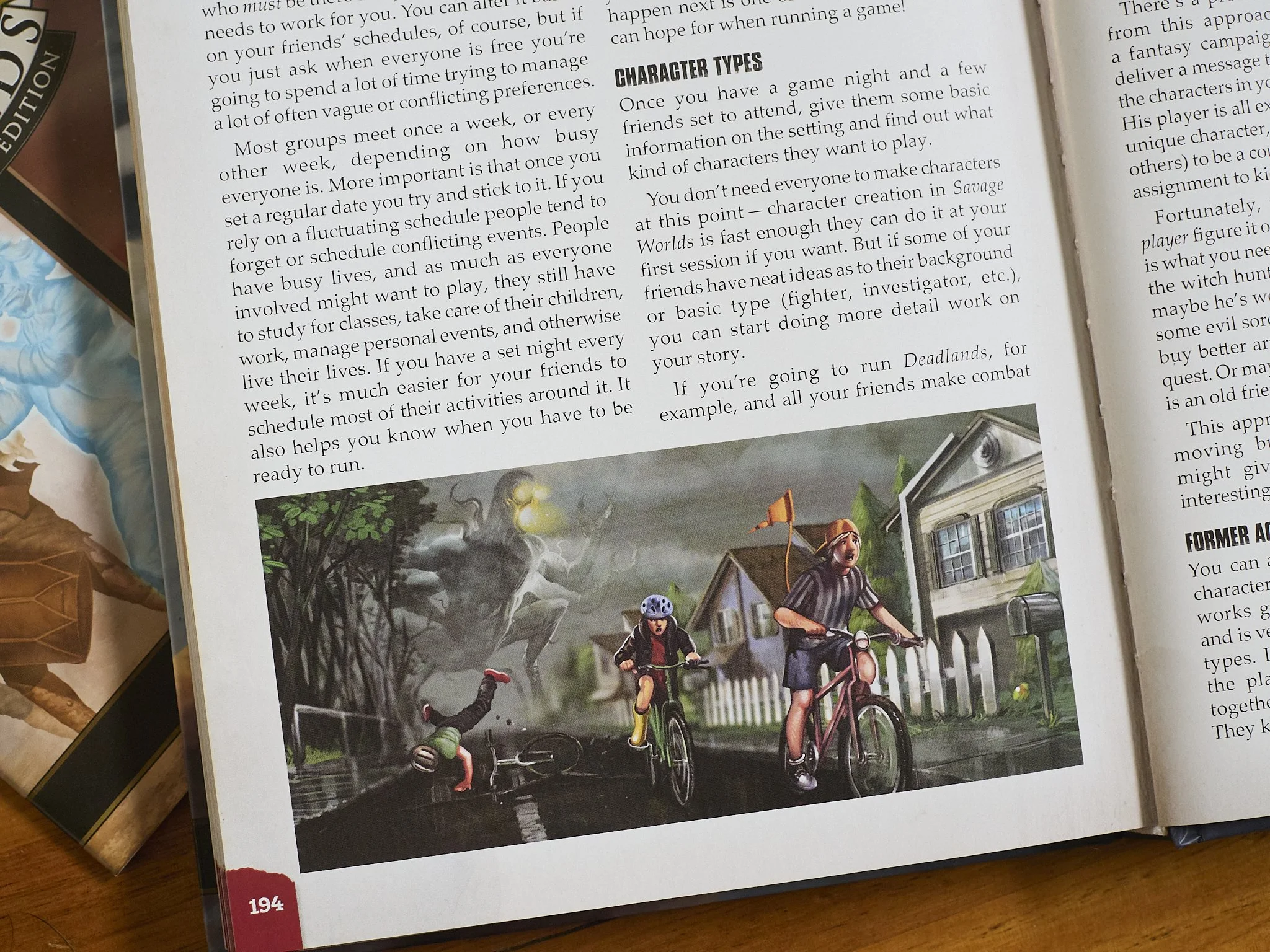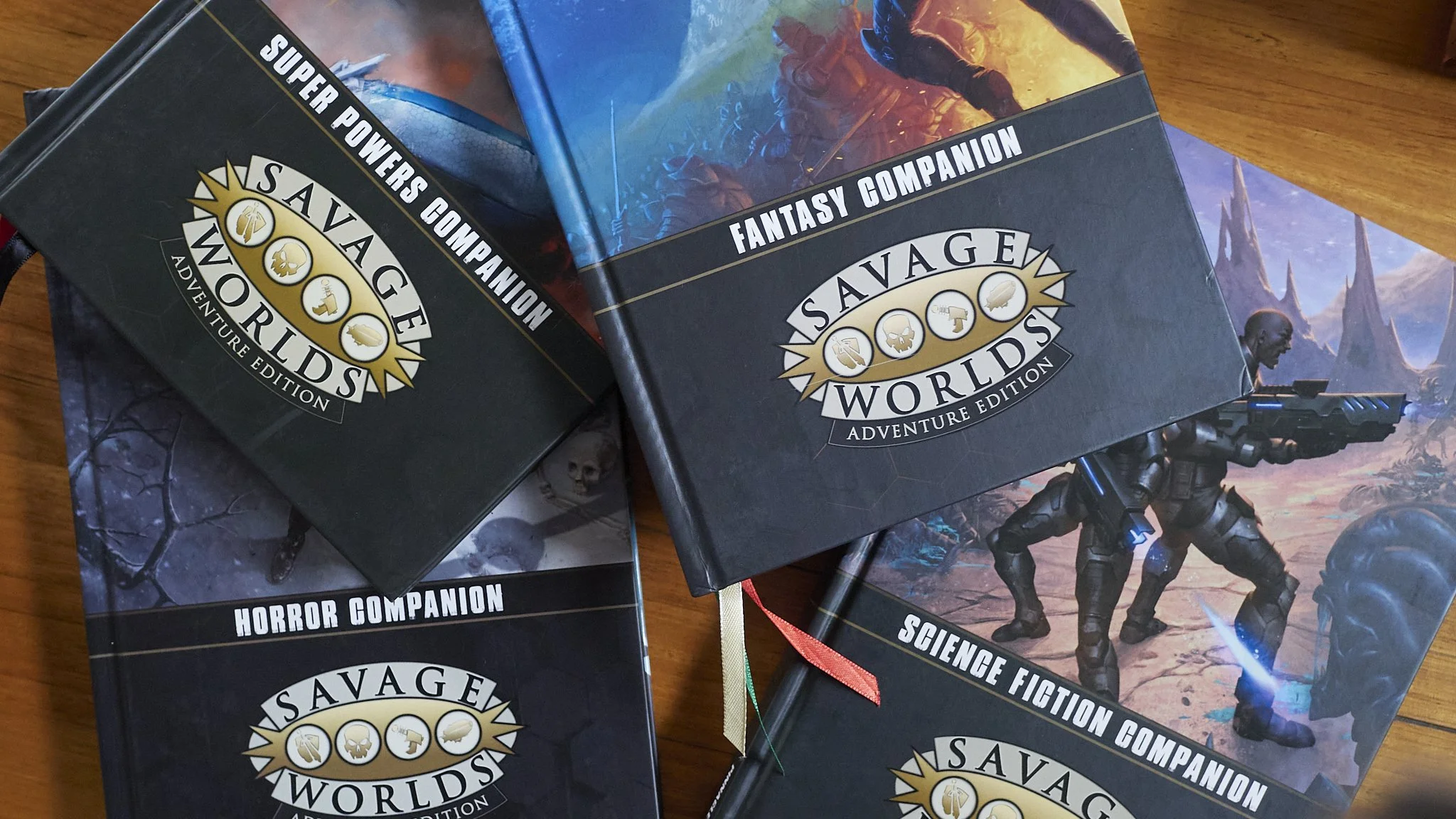I have always been drawn to generic RPG’s.
I accepted this as just a thing, nothing unusual, nothing out of the ordinary, just one of many genres, the “non” genre tied game.
The lure of a one system answer to anything that might pop up, any idea, any genre, any style is strong, but often flawed.
Generics have been around for almost as long as role playing. It started with fantasy, well medieval combat first, then fantasy, but as soon as any other style was conceived, be it sci-fi, horror or super powers, there was a desire to cross these over, to be more flexible in sub-genre and approach, to apply proven mechanics to another story base line.
I have been distracted lately. Several 60 hr weeks, regular 12 hour days and the relentless grind of the winter sports season has made me restless for something hobby related, which of late has been TTRPG’s (it rotates between minis games, TTRPG’s and board games).
This has led to looking at so many new and old games, but all roads have retuned to the two I have settled on, the bedrock D100 system and the newer and more modern Savage Worlds.
SW is a re-visit, but I bought into it this time, and the intent seems to be sticking firm, to be my light, generic, problem solver, my “anything” game, not a commitment to any specific game style or theme.
This is the game that can do anything on a light scale, quickly, cleanly and logically and if I want more it can grow with me.
The plus side to this is my moods and game desires change regulalrly. I get excited, obsessed even, buy something to address the itch, maybe several things, then move on. I usually revisit this mood space, but not always and rarely with the same gusto.
This pattern, once recognised, is now short circuited whenever I can. Knowing you have a problem is of scant use if you do not deal with it.
Generic games are a way of tackling the problem a different way, a better way.
Example;
I bought the Tales from the Loop, Electric State and other Stalenhag books for their evocative art, intriguing stories and originality. I then got drawn naturally to the TTRPG’s, which are aesthetic clones of the books and have the right feel.
The family of game mechanics are well generally respected in the right space, but different to anything I currently have and that sets two hurdles in my way. A new game to learn/teach and another set of expensive and highly focussed books.
These are the constant allure-repel reflexes.
The promise of more good, new horizons, new systems, pretty art.
The reality of mood limited use, frustrating systemic dislikes, likely failure to take.
Many games have fallen at these hurdles, like Symbaroum, Mork Borg, Death in Space, Warmachine Iron Kingdoms, Electric State and co, all because I am seeing the trend of chasing “shiny new” is ever faster becoming the reality of “shelf filler”.
Fuelled by The Loop books, I searched my existing collection of games for something that might do the “kids on bikes” style and settled on Savage Worlds and D100 as the two systems that could handle it. SW can do most styles, but leans towards Hollywood/Netflix style (16mm, E.T. Stranger Things), while D100 (probably M-Space) games are more grounded, more realistic and fit better with slow burn styles like The Loop and Electric State.
SW was the chosen one, basically because it felt right, had the actual mechanics for KoB games called out in the core book and was otherwise unused. It led to purchasing the four companions for more info and more themes.
Hard to argue with that.
At this point I realised the other, bigger benefit of generic games outside of being flexible.
Generic games give you a frame work, a core structure to build from, but they do not do all the heavy lifting. This means your imagination provides the rest.
This is how TTRPG’s started. A skeltal at best rule structure and tons and tons of imagination. The say “no two DnD games were the same” in the early days of the hobby was an under statement. They had to be different, because the bulk of the game was applied player and GM creativity, nt 200 page tomes on pre-written history.
In other words, every game had its own mechanical divergences (house rules), its own mood and theme, its own story line that grew in the telling. No Sword Coast, no Forgotten Realms, just participant input and creative agency.
A party met at an inn, in a village, in a kingdom, travelled to “X”, to do “Y” for a reward, then did it again until the kingdom, the continent and even the world were mapped out. Like any forms of free-form growth, you will never see two the same, no matter how familiar the root stock.
This is how Runequest became so deep, becoming the ultimate in “already made for you” worlds. It to grew from humble beginnings, but decades of accumulated knowledge has turned it into one of the most “known” worlds in role playing.
So much depth, which occasionally I like, but it tends to be more of a reading excercise with my own ideas springing from it.
I knew down deep that I was dissatisfied with RAW games, everything made to go like fast food. Umpteen editions of Traveller with the same Star Ships, Careers and Races are a comfortable fit, but they are so rigidly set in stone these days, they are a sort of reality.
Don’t get me started on the stereotypes DnD has made mantra.
Popular culture has become two things. The ever rarer “true original thinking” and the far more common “drawn from accepted tropes”, Harry Potter being probably the most successful of these. basically nothing in HP was original, it was just perfectly realised as a palatable version of itself for the masses. Elves, Undead, Giant Spiders, Wizards, Dragons, all done before, but HP just did it coherently, logically and with an engaging and consistent story.
Ok, back to the point.
Perusing the last of the SW companions, Sci-Fi, which not my favourite of the four, but likely the best of them for useful info, I came to realise, TTRPG’s for me are now two things. Highly mood and genre specific one-shots or short games and/or longer games, probably made up of lots of the first type. The “Styles of game” section really made realise that my mood shifts are not occasional and predictable like seasons, they can come mid-game, mid-sentence some times.
I am now more drawn to inspiration than facilitation.
Mothership is a good example of a game that can be easily hacked into main stream D100 or SW and is basically a one-shot engine, but as a bespoke game, if it were your only one I had, it would be prone to getting same-ish and illogical after a while, the trap of very specific games. You need to hold true to the tenets of the theme, the system and the mood, or they become useless.
A generic game, as long as it is easy enough to apply and generally fun to play, can be any game, any mood, any theme.
I now realise, part or most of the reason I like generic RPG’s is because I like the ability to create and make my ideas come alive in a way that others can share. Books I read, even games I play often spur ideas of things I would like to try, so looking at The Loop as an example, it excited me, then the idea of the game by the same name, no matter how well realised, put that flame out.
On the other hand I dislike and always have disliked, taking the ideas of others as rote, realising their vision, especially if I do not believe in some or all of it. Almost all, to be fair, give licence to diverge from the game as written, but it is often hard, when all roads lead to this vision and yes, you have paid (sometimes heavily) into it.
I recently did a quick survey, one of those on line things (should have known better). It was predictably trying to sell me something dodgy, but the questions, probably AI made or stolen, did allow me to realise that I have always rebelled against the flow. I cannot read a set of rules without wanting to either go back to old ideas of my own or modify the heck out of them.
I shoot small format Olympus for professional sport, shoot single shot not burst, went Panasonic for video when the world went Sony, use strictly manual flash and lots of other oddities, but that is me, always bucking the trend. Creativity comes from not accepting or repeating the same as has been done, but evolving, changing, taking chances.


